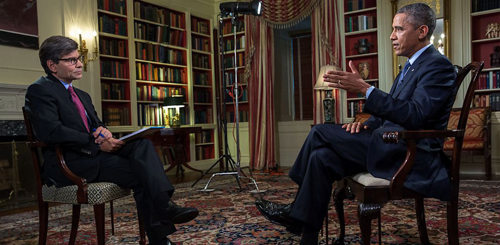
September 20-2013
President Obama stated flatly this week that the fact he has withdrawn his plan to strike Syria militarily doesn’t mean he won’t ever strike Iran militarily.
Obama’s renewed language of war infuriated Iran, as one would expect. But there was no negative reaction in the United States, where many analysts thought the broad opposition to the plan to bomb Syria meant the American public was tired of war and opposed to any military action.
Americans appeared to accept Obama’s comments that the challenge posed by Iran and its nuclear program was on a different level from the challenge posed by Syria and its chemical program.
Interviewed last Friday for ABC’s “This Week” with George Stephanopoulos, Obama said, “The nuclear issue is a far larger issue for us than the chemical weapons issue. The threat against Israel that a nuclear Iran poses is much closer to our core interests. A nuclear arms race in the region [which most American analysts believe will be set off if Iran builds a bomb] is something that would be profoundly destabilizing.
“My suspicion is that the Iranians recognize they shouldn’t draw a lessen that we won’t strike Iran. On the other hand, what they should draw from this lesson is that there is a potential of resolving these issues diplomatically.”
In Tehran, Foreign Ministry spokeswoman Marziyeh Afkham slashed at that next-to-last sentence and accused Obama of threatening war. But she completely ignored his last sentence about negotiations in her effort to paint Obama as a warmonger.
Obama continued: “The world community is united when it comes to wanting to prevent a nuclear arms race in the region. Negotiating with the Iranians is always difficult. I think this new president is not gonna suddenly make it easy. But, you know, my view is that if you have both a credible threat of force, combined with a rigorous diplomatic effort, that, in fact, you can strike a deal.”
That made clear, for the first time, that Obama has accepted the view that Iran will never be willing to strike a deal unless it feels its position is in danger. That argument has been propounded by many analysts in the United States—and, most vocally and frequently, by Israeli Prime Minister Binyamin Netanyahu.
In Tehran, Afkham took the opposite tack, repeating the standard mantra that Iran will never give in to pressure.
